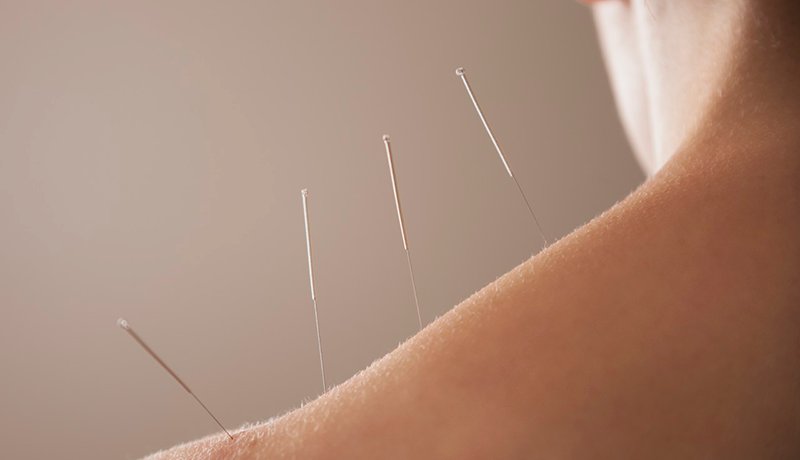Tell Your Doctor if You Use Alternative Pain Treatments

Many patients see chiropractors or acupuncturists without telling their doctor. But many doctors will not advise against these treatments.
People in pain often visit chiropractors and acupuncturists. In a large survey of muscle pain patients at Kaiser Permanente Northwest, a health maintenance organization serving about 500,000 members in Oregon and Washington, 32 percent said they had tried acupuncture, and 47 percent had seen a chiropractor — less than half had used neither.
But many did not tell their primary care doctor. That could be a problem.
“Chronic pain is a complex condition, so the care needs to be well coordinated," said Charles Elder, MD, the lead author and a Kaiser primary care doctor.
YOU MIGHT ALSO LIKE: 7 Myths About Back Pain
Why wouldn’t you tell your doctor?
You may have felt there wasn’t time. You may have waited for your doctor to ask you. You might worry that your doctor would be unsympathetic to alternative treatments and try to talk you into stopping.
But you’d be better off speaking up. You may need help evaluating the results or a complete record of what you’ve tried. Not all doctors will advise you against these treatments. Your doctor might even remind you of past successes with a chiropractor or acupuncturist if you experience a flare-up.
In fact, your chiropractor can work with your primary care doctor, pain experts, and surgeons to treat your back pain.
By definition, alternative medicine covers treatments that don’t have much or any scientific backing or are not widely accepted by doctors. But your doctor may have seen good results or think a treatment is worth a try.
For example, Elder says that chiropractic care can be effective for acute back and neck pain, and acupuncture can work for a variety of pain symptoms.
It’s hard, however, to prove that case. The latest review from the prestigious Cochrane Library, drawing on data from more than 8,000 participants, concluded that acupuncture was no better than a sham treatment for low back pain, although patients might feel better briefly after their sessions.
Does chiropractic help pain?
In addition to performing spinal manipulation, your chiropractor may educate you about exercise, ergonomics, and good posture.
Chiropractic has better results than acupuncture for low back pain patients, but only for temporary relief. A review of 42 high-quality clinical trials (with more than 9,200 participants) found that chiropractic had a modest effect on low back pain comparable to the benefits from recommendations for exercise or cognitive behavioral therapy.
There is some evidence that manipulations can help low back pain, but no back-up for chiropractic theory or the claims that chiropractic can help a host of other problems.
Temporary relief may be worth your time and effort. Just don’t buy into the claims that these treatments will cure an underlying problem causing your pain or dramatically change your posture or health.
Does acupuncture help pain?
Most of what you’ve heard about acupuncture is wrong, writes Harriet Hall, MD, a retired family doctor who writes about false medical claims.
Acupuncture is usually described as an ancient Chinese treatment, but it doesn’t appear to be ancient and may not even be Chinese. The first accounts of Chinese medicine that reached the West in the 13th century didn’t mention acupuncture.
You may have heard your acupuncturist talk about “meridians” and use the word “qi” for “energy.” According to Hall, that language was made up by a Frenchman, Georges Soulie de Morant, in 1939. Chinese people are much less interested in acupuncture than Westerners.
There are plenty of reasons why acupuncture could make you feel better, temporarily:
- Your attention is diverted.
- You want to trust the acupuncturist or find her likable.
- Maybe you want to believe you are spending your money well.
“All placebos are not equal — an elaborate system involving lying down, relaxing, and spending time with a caring authority can be expected to produce a much greater placebo effect than simply taking a sugar pill,” Hall explains.
When researchers have applied electrical current to the skin of the wrist, they obtained just as good results as when inserting needles. It appears not to matter where the needle is inserted.
Should you try massage?
Massage can help, briefly: In one review, it turned out to be superior to placebo or no treatment for low back pain.
While massage may make you feel better, don’t fall for the pseudoscience. Avoid “structural” massage, which is generally painful and no more effective than a relaxing massage.
Too much pressure can make you more tense and even feel like you have a flu, explains Paul Ingraham, the author of PainScience.com, an assistant editor at ScienceBasedMedicine.org. He is also a registered massage therapist who specialized in difficult chronic pain cases for a decade.
In one study, in which researchers called 91 massage therapy clients after their session, 10 percent reported “minor discomfort.” Most of them said it came on within a day and was gone within three.
Show anyone giving you a massage how much pressure you like, and tell them to back off if they dig too hard, Ingraham advises.
Sleep techniques for pain
If you regularly sleep better in hotels, on the sofa, or in your recliner, consider buying a new mattress. Sleeping poorly increases sensitivity to pain. You’ll need to pick your new mattress carefully; for tips see How to Relive Back Pain with Better Sleep.
As you search for relief, tell your doctor what you’re doing. Being heard and receiving feedback and advice can help quell your anxiety, which can be soothing in itself.
Updated:
January 12, 2023
Reviewed By:
Christopher Nystuen, MD, MBA and Janet O'Dell, RN